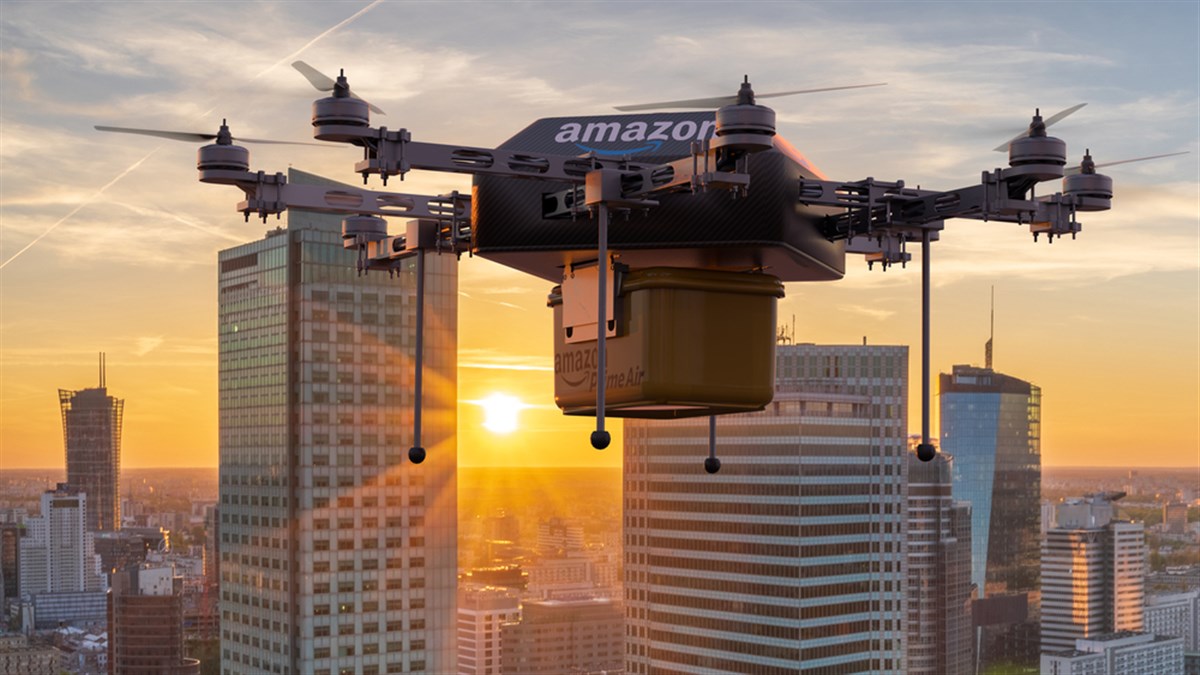How Amazon's Drone Deliveries Could Boost Profits and Valuation Amazon is the first company to offer same-day drone delivery, with subjects tested in Arizona before expanding. Wall Street and institutions are bullish
This story originally appeared on MarketBeat

Most of the market is now focused on the technology sector and its ability to deliver on the promises of artificial intelligence. However, there are many other innovations that should make it to the podium in the coming months. The idea of drone delivery for package services was introduced not too long ago, and it never got any attention until today.
In Arizona, one company has achieved what was thought to be years away. Amazon.com Inc. (NASDAQ: AMZN) has been cleared in regulation and safety to start offering same-day drone deliveries. Investors need to keep one thing in mind, and it is that Arizona is now the test subject for success and safety. If drone delivery goes well there, it could soon spread all across the United States.
That means a few things for Amazon stock, the main driver being increased market share and efficiency, of course. But what does that really mean? It means better margins and a greater need for its cloud computing arm, Amazon Web Services (AWS), to increase its footprint as drones need to be operated safely. The end result will be more profitability, making the stock seem cheap today despite high price-to-earnings (P/E) ratios.
Amazon Stock is “Expensive” For a Reason
When investors think of an asset as expensive, they often refer to valuation metrics like P/E ratios and others. However, the market is not a balancing game driven by ratios and equations; it also has a whole lot of psychology built into it. This is why the concept of expensive needs to be understood here.
Sure, Amazon stock trades at a significant premium to the rest of the retail sector, with an average valuation of 5.5x price-to-book (P/B). With a 11.4x multiple, Amazon should not be considered by any value investor as it is expensive, but it is expensive relative to what?
There are no other alternatives like Amazon; the only one that comes close is Alibaba Group (NYSE: BABA) in China, but investors aren’t too comfortable with overseas investments just yet, so that only leaves Amazon. Knowing this, it makes sense that the only player in town will command a premium over its industry, but there’s more to it.
Accepting that Amazon is tapped into the fast-growing world of artificial intelligence and that its data center expansion will monetize the new oil (data), investors can see a future where Amazon generates earnings per share (EPS) tenfold what they are today.
Then, the stock doesn’t seem that expensive anymore compared to where it could be five or ten years from now, does it? But, without getting too far ahead, this is what analysts think of the stock, keeping the next 12 months in mind.
Wall Street's View on Amazon Stock: Can Drone Deliveries Drive It Higher?
Today’s view doesn’t yet reflect the potential impact that these drone deliveries and the data center support they need could have on Amazon’s business as a whole. Still, Wall Street analysts' views today serve as a foundation from which investors can build their assumptions and projections for the future.
Starting with the ratings placed by those at Loop Capital as of November 2024, they were willing to stand out from the pack and its consensus target of $236.2 a share, as these analysts see the stock rallying to a near-term high of $275 a share, which is why they also reiterated their “Buy” rating on the stock as well.
To prove these targets right, Amazon would have to stage off a rally of as much as 25% from where It trades today, not an easy task to pull off being a $2.3 trillion company, but still realistic when investors take into account all of the growth drivers working in favor of the stock today.
Perhaps not directly related to the drone delivery announcements, but it wouldn’t be too far-fetched to imagine it is; three major institutional investors came in to buy Amazon stock at the start of November 2024.
Leading the way were those from Geode Capital Management, boosting their holdings by 3.4%, then Franklin Resources at 0.5%, and finally Toronto Dominion Bank at 6.1%. While the percentage increases act as a gauge, the net amount of investment can give investors a better view of these trends.
Geode now holds up to $37.1 billion worth of Amazon, with Franklin and Toronto Dominion holding a respective $8.8 billion and $932.6 million. These major positions reported only weeks after the new drone delivery announcement, could be a sign of what to expect from Amazon in the future.









